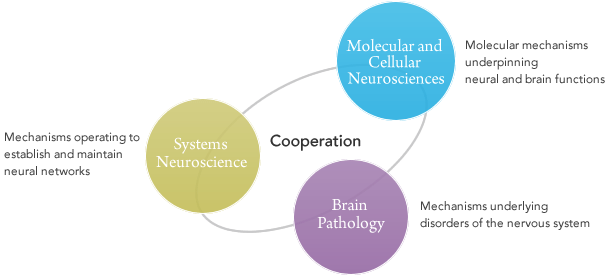About the School
Our brains underlie the uniqueness of human beings. Understanding how the brain works is therefore one of the most important problems in the science of nature and the mind. The outcomes of brain science research will also provide insight into how we treat/prevent neurological and mental disorders, and ultimately how we educate our children. In this regard, research in brain development and aging is significant not only to academia but also to our entire society. We therefore perceive the urgency of fostering young scientists who can lead and push this research field forward.
Our program faculty consists of internationally renowned scientists in molecular, cellular, systems, and pathological neuroscience. Their research interests include neural development and differentiation, protein trafficking, synaptic physiology, neural circuits, ion channels, and Alzheimer’s disease. The five-year training program revolves around these excellent research programs to foster next-generation scientists.
To achieve this goal, we encourage students to develop their abilities in critical thinking, problem and goal setting, and professional communication in addition to scientific knowledge and research techniques. We believe that acquiring these merits will help them excel and become true leaders not only in brain research but also in any areas of problem solving.
Graduate School of Brain Science
| Research department name | Graduate School of Brain Science |
|---|---|
| Specialty name | Major of Brain Development and Aging |
| Qualification | Ph.D |
|
Enrollments / total numbers |
10 / 50 |
|
Full-teaching staff / departments |
8 / 8 |
| Campus | Kyotanabe Campus |
Areas of study of each department, and educational organizational structure

- Molecular and Cellular Neurosciences
|
About the School |